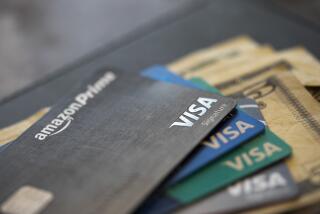Most Firms Can’t Afford to Buy Back Junk
- Share via
After the stock market crashed in October, 1987, blue chip companies pushed the prices of their securities back up and helped spur a broad comeback by buying back some of their shares from investors.
Now that the high-yield bond market is weak and prices are low, some debt-laden firms are taking--or considering--the similar tack of repurchasing their junk debt. But this time, many analysts say, the buybacks will supply no more than a little short-term help for the market.
The main problem is that most junk bond-financed companies are relatively weak and lack the financial resources to buy back much debt from investors.
“At the prices we’re seeing now, everyone is interested” in repurchasing junk bonds, said Bruce Eliot, a portfolio manger for the Los Angeles investment firm Houlihan, Lokey, Howard & Zukin. “The old problem,” he added, “is getting the cash to do it.”
As a result, junk bond issuers aren’t expected to buy back more than a tiny fraction of the $200-billion high-yield market. In turn, analysts say, that means that the buybacks will provide only modest aid for a market that has been falling since September and was roiled anew by this week’s bankruptcy filing by the parent of junk bond dealers Drexel Burnham Lambert.
Edward Altman, a finance professor at New York University who is an expert on junk bonds, called the buybacks “a positive force” but “not a dominant force or even close to it” in the junk bond market.
“It’s not enough to overcome Drexel and the major default problems in the marketplace,” he said.
Added John Lonski, senior economist for Moody’s Investors Service, “It’s not going to be enough to trigger a sustained rally.”
For all of the resentment fueled by junk bond-financed takeovers, there is concern among some experts about what could happen if the high-yield market continues to slump. The market, they say, has been an important source of financing for young companies unable to get badly needed funds elsewhere.
Companies that issue junk bonds typically lack the money to buy their own bonds because they often already are struggling to pay their current debts. For the same reason, banks are reluctant to lend them funds for bond repurchases.
In addition, because these firms typically are privately held, they aren’t in a position to swiftly issue stock to finance a bond buyback.
On top of that, most junk bonds have covenants that restrict the ability of companies to retire these debts. The bankers for junk bond companies often insist on the restrictions to make sure that the firms do nothing to undermine their ability to pay off their bank loans. In short, the bankers want to be sure that they are paid off first.
In some cases, the covenants bar companies from quietly repurchasing their bonds on the open market. That leaves the companies with the option of making tender offers for all of the outstanding bonds, but such a maneuver would be likely to drive up the prices of the bonds, making them prohibitively expensive.
Still, for companies in a position to buy back debt, it can be a very attractive option. In fact, on Wednesday, Revlon Group, the cosmetics and fragrance firm, announced that “subject to the availability of funds and market conditions,” it might buy back debt in the open market.
A spokesman for another company rumored to be repurchasing bonds, Los Angeles-based Caesars World, wouldn’t confirm or deny whether it actually is buying back debt. The spokesman, Jack Leone, would say only that “our people are looking at it every day.”
Other firms that reportedly are quietly buying back their junk bonds are National Intergroup, Colt Industries and National Gypsum.
One key advantage of a bond buyback is that it allows firms to cut their borrowing costs. A firm currently paying interest of 12% to 15% annually on its outstanding debt, for example, today might be able to retire those bonds and replace them with bank loans at around 11%.
At the same time, a buyback could improve a company’s balance sheet and thus help it secure other types of financing. For example, with some bonds currently selling for about 60% of their face value, a company could buy back bonds valued at $10 million on its books and replace it with a loan valued at $6 million.
Buybacks, however, could pose a long-term danger to the junk bond market, Altman said. He said that the purchases would remove some of the most solidly backed bonds in the market, leaving the market with a disproportionate amount of risky debt issued by struggling companies.
More to Read
Inside the business of entertainment
The Wide Shot brings you news, analysis and insights on everything from streaming wars to production — and what it all means for the future.
You may occasionally receive promotional content from the Los Angeles Times.










